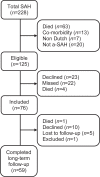Fatigue in relation to long-term participation outcome in aneurysmal subarachnoid haemorrhage survivors
- PMID: 33604676
- PMCID: PMC8814890
- DOI: 10.2340/16501977-2800
Fatigue in relation to long-term participation outcome in aneurysmal subarachnoid haemorrhage survivors
Abstract
Objective: To examine the association of fatigue with long-term participation in aneurysmal subarachnoid haemorrhage survivors.
Design: Cohort study, 4 years post-onset.
Subjects: A total of 59 patients with aneurysmal subarachnoid haemorrhage.
Methods: Participation performance was assessed with the Sickness Impact Profile-68, participation autonomy and problem experience with the Impact on Participation and Autonomy questionnaire, and community integration with the Community Integration Questionnaire. Fatigue was assessed with the Fatigue Severity Scale and depression with the Center for Epidemiologic Studies-Depression scale. Multivariable linear regression analyses were performed.
Results: Fifty-nine survivors (mean age 53.0 years, standard deviation (SD) 10.8 years) were included, of which 59.3% was fatigued. Fatigued patients had significantly worse participation scores than non-fatigued patients regarding performance (p < 0.001), autonomy indoors (p = 0.001), autonomy outdoors (p = 0.002) and problem experience (p = 0.001), but not regarding community integration. More severe fatigue was related to worse participation in terms of performance (B = 2.79, p < 0.001) and problem experience (B = 0.08, p = 0.003), adjusted for depression and inpatient rehabilitation.
Conclusion: Four years after onset, many survivors of aneurysmal subarachnoid haemorrhage have persistent fatigue, which is independently associated with reduced participation in activities of daily living. Therefore, future studies should investigate whether rehabilitation programs that focus on fatigue are effective in improving long-term participation outcome after aneurysmal subarachnoid haemorrhage.
Keywords: community integration; depression; fatigue; rehabilitation; social participation; stroke; subarachnoid haemorrhage.
Conflict of interest statement
Figures
References
-
- Macdonald RL, Schweizer TA. Spontaneous subarachnoid haemorrhage. Lancet 2017; 389: 655–666. - PubMed
-
- Rinkel GJ, Algra A. Long-term outcomes of patients with aneurysmal subarachnoid haemorrhage. Lancet Neurol 2011; 10: 349–356. - PubMed
-
- Nieuwkamp DJ, Setz LE, Algra A, Linn FH, de Rooij NK, Rinkel GJ. Changes in case fatality of aneurysmal subarachnoid haemorrhage over time, according to age, sex, and region: a meta-analysis. Lancet Neurol 2009; 8: 635–642. - PubMed
-
- Al-Khindi T, Macdonald RL, Schweizer TA. Cognitive and functional outcome after aneurysmal subarachnoid hemorrhage. Stroke 2010; 41: e519–536. - PubMed
MeSH terms
LinkOut - more resources
Full Text Sources
Other Literature Sources
Medical


